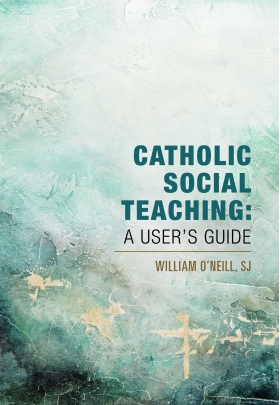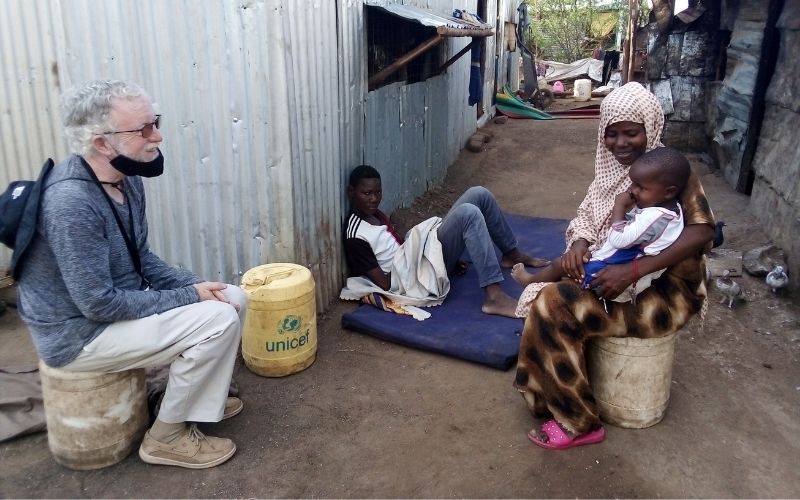A User’s Guide to Catholic Social Teaching: Author Q&A
BY ISN STAFF | September 21, 2021
Editor’s Note: ISN recently spoke with Fr. William O’Neill, S.J., author of a new book, Catholic Social Teaching: A User’s Guide. Fr. O’Neill is professor emeritus of social ethics at the Jesuit School of Theology at Santa Clara University. He is currently working with the Jesuit Refugee Service in Nairobi, Kenya.

Catholic Social Teaching: A User’s Guide, by Fr. William O’Neill, S.J.
ISN: Share with us the foundations of this book—how was it developed? Why did you feel called to create this resource?
Fr. O’Neill: This small book began as an introduction to the Catholic Church’s social teaching for the Jesuit Refugee Service (JRS). While Catholic social teaching (CST) is at the heart of our JRS mission to accompany, serve, and advocate on behalf of refugees and the forcibly displaced, many of our staff are not Catholic. Not only members of other Christian denominations and faith traditions, but agnostics also contribute to our common mission, so we were in need of a general introduction for “users” of CST.
ISN: Can you summarize what Catholic social teaching is and how it relates to the Gospel?
Fr. O’Neill: Catholic social teaching is the Church’s modern answer to an age-old question. When Jesus begins his public ministry in Nazareth, he quotes from the prophet Isaiah: “The Spirit of the Lord is upon me to proclaim good news to the poor.” In covenant fidelity, the Lord God is revealed in releasing captives and restoring sight to the blind, freeing the oppressed, and establishing a year of favor (Lk 4: 16-21). Jesus tells us that “Today, this scripture has been fulfilled in your hearing.” But in Luke’s Greek, the fulfillment lasts in history, as invitation and command. Every generation must ask how the prophetic message becomes Gospel, Good News, “today, in our hearing.”
CST begins with Pope Leo XIII’s letter, or encyclical, Rerum Novarum (1891), as a response to the grave injustices suffered by workers in the modern era. Taking up the prophetic mandate, other encyclicals, Church decrees (e.g., of the Vatican Council), and bishops’ letters like those of the martyred Saint Oscar Romero denounce the social sins of poverty, violence, and systemic racial, ethnic, and gender bias.
Announcing the “Good News” follows such denunciation, as the Church seeks to translate the biblical demands of justice and peace into a modern, secular idiom. Catholic social teaching is thus also “catholic”—in the Greek sense of being universal or intended for all: CST upholds the dignity of every person and the inalienable human rights that respecting dignity implies. Dignity and rights bind us in solidarity as we seek justice for those most vulnerable. CST defends the rights of workers, migrants, and refugees, mindful that women and children are invariably among those consigned to society’s margins. In the same spirit, the Church pursues a “ministry of reconciliation” (2 Cor. 5:18) in the face of war and ethnic strife, seeking a genuine peace (shalom) that can only be founded on justice. And as Pope Francis has reminded us in his encyclical, Laudato Si’, the “cry” of the poor” is the “cry of the earth.” An “integral humanism” presumes an “integral ecology.”
CST thus offers an integral and comprehensive (intersectional) response to the Gospel’s question: how are Jesus’ prophetic words to be fulfilled “in our hearing”? But CST is not a rule book! Rules apply “top down, but we live “bottom up.” Like learning a game, football or chess, the principles of CST must be embodied in a way of life, a prophetic commitment to what Pope Francis calls our common “struggle for justice, love, and peace.” And teaching is always learning, inspired by the lives of prophetic witnesses like Dorothy Day, Dom Helder Camara, Saint Romero, and Mother Teresa.

The author (left) at Kakuma Refugee Camp in northwestern Kenya, where he is serving with Jesuit Refugee Service.
ISN: Tell us a bit about your background and your current work—how has Catholic Social Teaching been integral to your ministry?
Fr. O’Neill: For 30 years, I was privileged to teach social ethics at the Jesuit School of Theology of Santa Clara University. Together with students from many countries, we explored the history and development of CST and its implications for the challenges we face today—genocide, systemic racism, forced migration, gender bias, ethnic strife, homophobia, poverty, etc. While teaching, I served for many years as Catholic chaplain for women, especially minority migrant women incarcerated at the Federal Correctional Institute in Dublin, CA. Prior to my own studies, I worked with young refugee children in Tanzania and after stepping down from JST in 2019, I resumed my work with refugees, serving with JRS in the Kakuma Refugee Camp in northwestern Kenya. This little book was completed there.
ISN: What are your hopes for this resource? How do you hope that it will transform individuals and communities?
Fr. O’Neill: Tradition, as one of my teachers used to say, is the “living faith of the dead,” whereas traditionalism is the “dead faith of the living.” So often, the Church’s moral teaching seems a litany of “no’s” when it is finally an “Amen”—a yes to the divine Amen fleshed in Jesus. CST is a way of life, of incarnating the Gospel in our generation, “today in our hearing.” Certainly, Ignatian solidarity is inspired by CST, and more by those who live it, the great saints like Romero and Day, but also our companions on the way, in the Ignatian solidarity movement.
Yet sadly, CST often remains “our best kept secret.” This little book, with others, like Thomas Massaro, S.J.’s Living Justice, is an attempt to spread the good news. At Cardinal Michael Czerny’s request, we used it in a workshop for the Migrants and Refugees Section of the Vatican’s Dicastery for Promoting Integral Human Development. And we have incorporated it in our orientation programs for JRS’s national staff members. Part One of the book offers a brief overview of the history, development, and key themes of the tradition; while Part Two addresses a range of issues, including the priority of labor over capital, poverty, racial and gender bias, the ethics of war and peace, forced migration, and social reconciliation. My hope is that it will be a helpful guide for all of us committed to the “struggle for justice, love, and peace.”









Tradition is the “living faith of the dead,” whereas traditionalism is the “dead faith of the living” – JRS is doing fine.